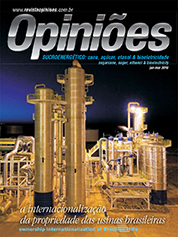Guilherme Campos e Nicolás Vergara
Risk Superintendent and Risk Consultant of Banco Santander
Op-AA-23
Internationalization of mill ownership: a "needed good"
Brazil has always stood out for its high agricultural potential, a characteristic explained by favorable climate, land availability and good productivity indicators reached in recent years. The sugar-based energy industry was no exception and the country became the main sugar producer and exporter of the world, apart from having reached a frontline position in the use of ethanol as fuel.
Notwithstanding this favorable position, in recent years important groups of the industry were adversely affected by the practiced low prices, associated with the increase in leverage resulting from higher levels of investment and exponentialized by the lack of liquidity brought about by the financial crisis that impacted the world.
This scenario, which on the one hand helps deteriorate the value of assets, on the other hand makes them more attractive in the eyes of potential investors, given that the long term perspectives remain positive and Brazil continues being the protagonist in the production of sugar and sugarcane ethanol, the most competitive in the market.
This new entry process of capital in the industry may be analyzed in two distinct moments. The first is characterized by the opportunity provided by the imminent need to maintain assets in operation, solving short term problems (suppliers, government, financiers, etc), to assure companies’ existence and to put them back on track.
The second moment, which we will experience still in 2010, will be characterized by the rebounding of investments, now adequately financed, the consolidation of large groups in the industry, the realignment of balance sheet structures, and renewed exposure to capital markets. The crisis faced by the mills also showed the importance of professionalizing management.
In light of the need for complex financial restructuring, what one observes is the great difficulty in concluding processes, mainly when dealing with family-run businesses, some of which have a great number of family members, in which the slowness in making important decisions weighs against these very companies, making the short term situation even worse.
From this perspective, the entry of foreign capital in the industry turns out to be a “needed good”, to the extent that, apart from financial resources, it brings with it the so much wanted professionalization of management, along with more focus on the issue of required sustainability and credibility to improve the image of the Brazilian sugar and ethanol industry abroad, which is still unduly marked as being a problem from the social and environmental point of view.
This does not mean that Brazilian capital cannot be a part of this process. It could actually participate through large economic groups (not necessarily belonging to the industry). It simply means that large multinational corporations could more rapidly provide the industry visibility, forming the necessary framework to develop the ethanol market in a consistent manner, making feasible its growth at the international level.
In this regard, the parties best suited to assume the consolidating role are large international conglomerates in the supply chain. Predominantly they are:
1. trading companies that benefit from their expertise in the distribution of commodities and their access to international markets and;
2. oil companies seeking to diversify their fuel sources while focusing on renewable energy, which also implies greater effort in developing international ethanol markets.
New market entrants must pay special attention to agricultural management, considering its great importance for a business’ success, a subject in which traditional mill owners are very knowledgeable, making associations quite an interesting alternative to pursue. One cannot ignore the existence of Brazilian groups with a sound financial situation during and after the crisis.
However, with the consolidation process and the forming of large groups that start having relevant participation in the market, those that were initially left out are expected to be pressured into forming new clusters of producers, in order to attenuate adversities inherent to the cyclical dynamics of the activity in light of the new competitors.
The entry of large international groups, the consolidation and subsequent strengthening of the market are essential for regaining credibility in the banking market, affected by the financial collapse experienced by the industry. At this point, one should mention financial institutions’ great interest in an industry whose importance for the country is acknowledged and which has high potential to contribute to changing the world’s energy matrix.




